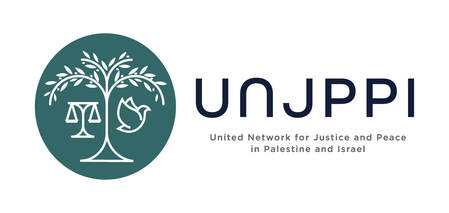Mission Statement
In discipleship of Christ, and in solidarity with churches and other partners in the Middle East as well as globally and in Canada, this Network covenants to engage, consolidate, nourish, and channel the energy in the United Church of Canada toward the goal of a just peace in Palestine/Israel, primarily through calling for an end to the Israeli occupation of Palestinian lands and for equal rights for all who live in Palestine/Israel, by facilitating education, promoting partnerships, coordinating advocacy, advancing policy and encouraging action.
Learn more about the Network...
Learn more about the Network...
Palestine/Israel Background
What is UNJPPI?
UNJPPI (United Network for Justice and Peace in Palestine/Israel) is a grassroots network of United Church members and adherents, and other friends, which has been established to respond to the requests from leaders of Palestinian churches outlined in the Kairos Palestine Document (KPD). The Kairos Palestine Document eloquently describes the long-standing and worsening conditions faced by Palestinians living under the illegal Israeli occupation of the West Bank and Gaza. The Palestinian Christians urgently call on churches worldwide to come to the aid of Palestinians. It says that doing nothing is not an option and asks for action. UNJPPI seeks to raise awareness of the conditions of Palestinians under the illegal Israeli occupation and encourages action to pressure the state of Israel to end the occupation of and building of Israeli only settlements in Palestinian land.
UNJPPI Website: www.unjppi.org To join the network and subscribe to a mailing list, click here. |
Our Mandate...
Our Response to the Palestinian Call:
The United Church’s 41st General Council met in August 2012. The United Church of Canada has always tried to respond to the calls of our partners. This commitment is reflected in the Principles of Partnership, which include mutuality, and accountability, shared decision-making, dialogue, joint advocacy, and shared vision, among others. As we continue to live into the commitments of global partnership in the United Church, it is time to respond to our partners in Palestine.
We are an informal network of United Church people who support a non-violent solution to the Israeli occupation and a just peace in Israel/Palestine. We encourage you to respond to this call from our Christian Palestinian partners by responding positively to their call to repent for our complicity, to come and see the realities in Palestine, to condemn racism, and to support Boycott Divestment and Sanctions as a non-violent form of resistance to the Israeli occupation. The GC41 Backgrounder outlines our support regarding this issue at the General Council 41. We invite you to dialogue with us about how you can be part of the work as we try to support the decision of GC. Please check out our educational resources and as well as through the Kairos Palestine Study Guide which is available through the United Church Resource Distribution (UCRD) Centre. Please work together with us to support a just and lasting peace in the Middle East. United Network for a Just Peace in Palestine/Israel, GC Advocacy Team. Resources:
EAPPI web site (www.eappi.org)
An important resource for daily reports from Palestine. CJPME (www.cjpme.org) A rich resource of information on boycotts and other actions. CFOS (https://friendsofsabeel.ca/) Canadian Friends of Sabeel is a Canadian network of Palestinians and Canadians supporting Sabeel, a Palestine Liberation Theology Centre in Bethlehem. Provides authentic Palestinian perspective. UN Office of the Coordination of Humanitarian Affairs in Occupied Palestinian Territory |
Anti-Semitism
We appreciate the courageous initiatives of the United Church since 1997 to redress anti-Semitism, (that is, the promotion of prejudice and discrimination against Jews and Judaism). The KPD criticisms of the Israeli state are not anti-Semitic. In fact the KPD condemns “all forms of racism, whether religious or ethnic, including anti-Semitism” (p.23) and it respectfully appeals to Jewish (and Muslim) religious leaders to recognize our mutual obligation to “defend the oppressed” and to “rise up above the political positions that have failed so far.” (p.34)
The 2003 United Church policy document Bearing Faithful Witness pointed out, "As a modern nation-state, Israel, like all other nation-states, is subject to the moral ambiguities of power, which by definition, is never innocent and never can be innocent. Even if Israel is conceived in religious and theological terms, as, for example, a land promised by God to the Jewish people, this fact remains true. Indeed, the faith component makes criticism even more necessary because of the dangers of self-righteousness inherent in any religious nationalism. … Legitimate criticism [of Israel] concerns itself with specific policies and actions on the part of Israeli leaders and governments as well as the enduring problems and tensions of Israeli society. Legitimate criticism is always able to distinguish between a regime and a people…" Bearing Faithful Witness, p.13 We understand that those who support the KPD calls for action have been attacked as “anti-Semitic” and threatened with “ruining the United Church’s relationship with our Jewish brothers and sisters”. To this we say: Don’t be afraid! It is a moral imperative to oppose the unjust and unethical behavior of any nation-state, including Israel. Criticizing, condemning, and taking action against the policies of an occupation that is perpetrated by the Israeli state is not anti-Semitic. The United Nations and World Court have ruled repeatedly that the Israeli occupation of Palestine is illegal. Jewish scholars also argue that the occupation undermines the moral legitimacy of Israel and damages Judaism itself.[i]! Many Jewish organizations in Canada and internationally, including Independent Jewish Voices, Jews for a Just Peace, Jewish Voice for Peace, and Rabbis for Human Rights, whole-heartedly support the KPD’s call to churches to take a stand on the side of a just peace in Israel/Palestine. [i] . Marc H. Ellis (2009) Judaism does not equal Israel. (N.Y.: The New Pess); Gersom Gorenberg (2011) The unmaking of Israel. (NY:HarperCollins); |

